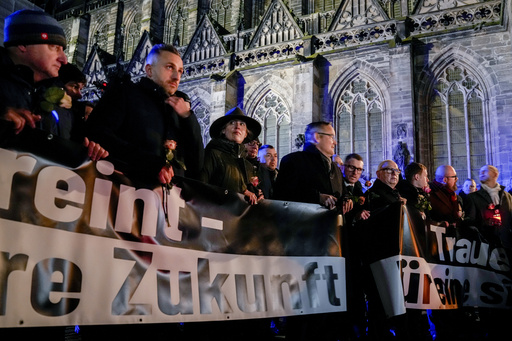
MAGDEBURG, Germany — In the aftermath of the tragic Christmas market assault, community members converged on the site to pay their respects, placing flowers as investigators seek to uncover the suspect’s motive and examine his prior interactions with the authorities. There are growing concerns that this incident might exacerbate existing societal fractures in Germany.
The Johanniskirche church, located just a short distance from where the attack occurred, has transformed into a focal point for mourning. Following the tragic event on Friday night, where a vehicle was driven into a bustling market, five lives were lost, and the sidewalk in front of the church has become adorned with a multitude of floral tributes.
Prosecutors have reported an increase in the number of individuals injured from the attack, now numbering as high as 235, with many more seeking medical assistance, although there may have been some duplication in the reporting. The suspect, identified as a Saudi doctor who arrived in Germany in 2006 and was granted permanent residency, does not align with the typical profile of extremist attackers. He has claimed to be an ex-Muslim and has voiced strong critiques of Islam, alongside expressing support for far-right ideologies on various social media platforms.
Emerging information reflects a history of troubling behavior that had drawn the attention of authorities, including prior threats, but he had not been known to commit acts of violence. According to Tamara Zieschang, the interior minister for Saxony-Anhalt, police had made contact with him in both September and October of this year, though the reasoning for these interactions was not disclosed. German Justice Minister Volker Wissing commented that despite warnings and reports about the suspect, the typical profiles of suspicious individuals did not accurately represent him due to the erratic nature of his political views.
Wissing suggested that Germany may need to reconsider its security measures, stating that a significant conversation about the country’s safety protocols is warranted, yet he felt it was premature to draw definitive conclusions given the ongoing investigation. At the same time, Vice Chancellor Robert Habeck expressed concerns that the attack might incite a wave of misinformation leading up to the national elections scheduled for late February. He urged the public to resist falling prey to hatred.
“There is still so much that remains unclear, including the suspect’s true motive,” Habeck stated in a video message on Sunday. He expressed apprehension that the immediate unrest spreading on social media regarding Muslims, foreigners, and immigrants might further entrench feelings of distrust within society.
During a rally organized by the far-right Alternative for Germany (AfD) party outside the cathedral in Magdeburg, co-leader Alice Weidel condemned the attack, labeling it an expression of “Islamist hatred directed at the very fabric of human unity… for us Germans, for us Christians.” The incident continues to stir strong feelings and calls for reflection on underlying issues within the community.

